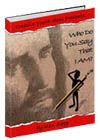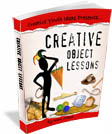You’ve heard the hymn:
My hope is built on nothing less than Jesus Christ, my righteousness;
I dare not trust the sweetest frame but wholly lean on Jesus’ name.
On Christ, the solid Rock, I stand; All other ground is sinking sand,
All other ground is sinking sand.
It’s a familiar Hymn, but what does it mean for Christ to be My Rock?
Introduction Activity
Materials: Stones of assorted sizes and shapes..
Preparation
Collect a variety of stones of different shapes and sizes. For the first activity you can place all the stones in a common pile, or split them into two separate piles with an equal number of stones.
STAGE 1: Divide into two teams and see which can build the highest tower. The key to doing this will be to make the bottom stable and continue to build the tower as stable as possible.
STAGE 2: In this activity everyone competes again everyone else. Each person in turn places one of the stones on the tower. The first person to place a stone is the only one allowed to place a stone touching the ground. The objective of this stage is for each youth to choose one of the remaining stones and place it on top the already existing stones to build the tower a tower without it falling down. Subsequent stones can rest on any already existing stone, but cannot touch the ground. Any player who knocks the tower down or causes a stone to fall off while placing his/ her stone on the tower is out of the game. Continue until only one player is left. The key to this stage is to try to make it difficult for the next person to place a stone without knocking the tower over.
Debrief
Discuss the strategies of the two games, noting that if you want something to last, you must build on a solid foundation.
Digging into the Word
Read Luke 6:46-49 in your Bible
Jesus asks,
“Why do you call me, ‘Lord, Lord,’ and do not do what I say?”
In other words, “Why do you say I am Lord of your life and yet you do not listen to me and obey me.” He then gives us a parable of two houses that teaches us four things.
1. The houses looked the same.
Both men in the story built a house. They looked the same, but there was a major difference not noticed by those who passed by. One house had a solid foundation and the other did not. A solid foundation in Biblical times consisted of two things – the actual foundation and a cornerstone.
1A. The Foundation (Reference verses: 2 Tim. 2:19; I Tim. 6:19)
A foundation was a whole substructure of a building. It was something put down to stabilize a building before construction started.
- What are some of the things people have as the foundation for life?
- What things do people base their lives upon?
(You may wish to give the stones back to the group members and have each write an answer to the above question on it. Another option may be to play a game of “Jenga” or “Uno Stacko” and have each youth name something people base their lives upon before pulling out a block and replacing it on top. Continue until the stack is toppled. You may wish to destabilise the stack from the onset to speed up the game)
Some of the common answers are:
Wealth, success, fame, acceptance, pleasure, logic, principles, fairness, justice, pleasing others, family, relationships, treasures, accomplishments, and specific goals are all possible answers. Your goal in life, your reason for living, is the foundation of your life.
In I Corinthians 3:10-11 (verses 12-15 are talked about later) Paul talks of building on the foundation of Christ. Christ is the only foundation. To build on anything less than Christ is to build on no foundation at all.
In Ephesians 2:20 Paul tells us that we are built upon the foundation of the apostles and prophets and even Christ Himself. We have a heritage (a foundation), portrayed for us in the biblical examples by the godly men and women who lived before us. But in order to know the Bible and it•s characters I must spend time in the Word. The stories and testimonies of the people in that great Book give us a first hand example of how to encounter life as Christians.
- What does your life reveal about your personal foundation?
- Is Christ your foundation?
- Do you spend time in the Word studying the character examples of His people? Why or why not?
1B. The CORNERSTONE (Reference verses: I Peter 2:6; Acts 4:11, 12; Matthew 21:42; Isaiah 28:16, Matthew 7:24;1Corinthians 3:11; I Tim. 6:19; 2 Tim. 2:19; Eph. 2:20)
The cornerstone was the basis of a building in the days of Christ. The cornerstone kept the building’s walls lined up correctly. It kept things straight. If the cornerstone was no good, the building crumbled. It’s the same with our lives today. We choose what we want to base our lives on or build them around. When we choose Christ we have chosen what God’s Word says is the most precious cornerstone of all. We can use Christ and his example to line up our lives, to keep things straight. When Peter wrote about Jesus as the corner stone he had a good literal definition from life in Bible times of a corner stone. It was a huge rock large enough to mill wheat or grain that became the huge stone that whole large buildings were built upon. Yet even more importantly he saw first hand, the life of Christ, and could build his life in line with the example and teachings he saw.
In I Peter 2:6, Peter writes that when we believe in, trust in, adhere to and rely on Jesus we will never be disappointed or put to shame, disgraced, made to blush or be dis-honored. Our lives will not crumble as long as we build them according to His blueprints. Peter really believed that life with Jesus Christ was never disappointing.
- What do you think Peter means that we won’t be dishonored or disappointed if we trust in and rely on Christ?
- Have you ever been really put to shame or disgraced because of your belief in Christ?
In Acts 4:11, Luke tells us that this cornerstone is the basis of our faith and that it is only through relationship with Jesus Christ that we can have eternal life. Matthew 21:42 says that this was God’s plan and He finds it marvelous! (also refer to Psalms 118:22, 23) God planned for me to base my life on His Son Jesus!
- What or Who is my cornerstone?
- Have I rejected Christ in some areas of my life?
- If I am rejecting Christ, is my ENTIRE building founded on Christ?
- Is my building, my life, crumbling from poor construction?
Many people in the church are like these two houses. They may profess to be Christians and look like Christians in all their actions, but they are not Christians. Their life in not really built upon Christ. Actions and works do not determine if a person is a Christian. Ephesians 2:8-10 says that we are not saved by good works, but we are reborn or recreated in Christ Jesus for the purpose of doing good works. In John 14:6, John 17:3, and John 5:24 Jesus tells us he is the only way one can go to heaven. In I John 5:11-12 we are told that he who has Christ has eternal life. He who does not, does not have life. There is only one way to be a Christian and that is through Christ as the foundation of your life. A non-Christian can go through the actions of a Christian, and yet still not be a Christian. The house is there for all to see, but there is no foundation.
There are also those who are Christians, and have Christ as a foundation, but choose not to build on that foundation. Having Christ as the foundation is the initial step, but building on that foundation is something done daily, in the everyday decisions of life. How silly it would be if we saw a construction company lay a large solid foundation and then build on the ground instead of the foundation. They could even build with good materials and good works, but without building on the foundation everything built will be swept away. In Luke 14:25-30, 33 Christ speaks of the cost of being a disciple. He uses the parable of a man who wished to build a great tower, but the cost is too great for him to finish it. He is ridiculed because of his folly. To follow Christ is to give up everything for Christ, to surrender all to Him. We too, like the man in the parable, will be ridiculed and seen as a fool if we claim to be a Christian yet build our life upon other things. We need to clear away the rubble and build on the foundation!
1C. Clearing away the rubble.
As you read the focal passage you see that one man dug down deep, to the rock. He cleared away the rubble, removing that which would make his house unstable and building on the rock.
- What rubble in your life do you need to clear away in order for Christ to be your foundation?
2. The time it took to build the house does not matter.
The time it took to build the house is not mentioned. It doesn’t matter. One may have been going to church and doing good things all his life, but unless Christ is the foundation, the house still will fall. It is never too late to begin building your life with Christ as the foundation.
3. The storms are the same.
A life without storms is not promised to Christians. The storm that hit the house with the solid foundation was no different than the one that hit the house without a foundation. The end result was different, but the storms were not. What is promised Christians is a foundation to weather the storms.
Why does God allow storms in our lives?
a. to teach us.
b. to test us, reveal our character
c. to toughen us up so we are stronger
I Corinthians 3:10-13 talks about the foundation of our lives being revealed IN our lives. God’s Word says there that the trials of life will reveal just what our foundations are made of! It continues on to say that those same experiences will reveal our character and the worth of the work each person has done.
Often it is the response to storms that really differentiates people. Through storms our foundations are shaken. Through storms we discover what areas in our lives have leaks and cracks and need repair. Through storms we may even discover that we never had a foundation. What storms have shaken your foundation?
4. Ultimately, the house without the foundation will fall.
The house will completely collapse that does not have Christ as a foundation. There is no option of a house half standing. What ever is built on the foundation will survive. What is not built on the foundation will be swept away. All things built will one day be judged. It is possible to be a Christian and do the right things, but for the wrong reasons. I Corinthians 3:10-15 says that our works will be judged and us rewarded accordingly. It is possible for us to get to heaven, having only the foundation with everything we have done being burnt up. As a friend once said, we would make it to heaven, but only in our underwear and those likely would be scorched. There would be no rewards. In Matthew 6: 1-8 we are told that God judges not only our actions, but our motives.
————————————————————
Take It To The Next Level
————————————————————
“Building Plans” Activity
Materials: Stones, paper
Have youth build something with the stones to represent what they want their life to be like. Encourage them to share the commitments they are making for building their life upon Christ.
My building plans…
1. Is my life the same on the outside as everyone else’s, but without a foundation? The foundation, my reason for living, right now is:
I need to make Christ the foundation of my life by:
2. What areas of my life am I not building on the foundation of Christ?
I can surrender these areas to Christ by:
3. Will the faith I profess stand the storms of life? Is Christ a temporary thought, a momentary decision, or a continuing commitment in my life? Explain.
4. Christ isn’t looking for an emotional experience, but commitment and total surrender to Him. I am committed to making my decision more than a mountain top experience, an emotional high. I am surrendering my life to Christ in all areas and truly committed to making Christ the foundation of all I do.
(Signature) __________________________________
————————————————————
Scripture
————————————————————
Luke 6:46-49
“Why do you call me, ‘Lord, Lord,’ and do not do what I say? As for everyone who comes to me and hears my words and puts them into practice, I will show you what they are like. They are like a man building a house, who dug down deep and laid the foundation on rock. When a flood came, the torrent struck that house but could not shake it, because it was well built. But the one who hears my words and does not put them into practice is like a man who built a house on the ground without a foundation. The moment the torrent struck that house, it collapsed and its destruction was complete.”

“Who Do You Say that I Am?” Youth Bible Study Series
Looking for a Bible Study Series for the summer that is both evangelistic and also faith building for your Christian youth at almost any level of maturity?
There are 7 Primary Bible study Sessions in the series:

- Jesus the Life Saver – Matthew 14:22-33
- Jesus, My Friend – John 15:9-15
- Jesus, Fear Slayer – Luke 8:22-25 or Mark 4:35-41 or Matthew 8:23-27
- Jesus, the Healer – Mark 5:22-34 or Luke 8:40-48 or Matthew 9:18-26
- Jesus, The Obedient – Luke 7:1-10 or Matthew 8:5-13
- Jesus, The Spirit-Powered Man – Luke 4:14-30 (Luke 4:18)
- Jesus, The Cleanser – Romans 8:29; Selected Passages
Find out more here:
“Who Do You Say that I Am?” Youth Bible Study Series

 MORE IDEAS? See “Creative Object Lessons”
MORE IDEAS? See “Creative Object Lessons”
![]()



